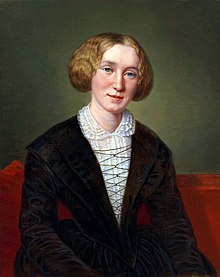At the conclusion of Middlemarch, her classic novel about nineteenth century life in rural England, George Eliot (in truth, Mary Ann Evans), writes, "For the growing good of the world is party dependent on unhistoric acts; and that things are not so ill with you and me as they might have been, to half owing to the number who lived faithfully a hidden life, and rest in unvisited tombs."

Rarely does a single sentence hold such profound meaning. In words rippling with present and eternal verity, Eliot reminds us that however much we may suppose that we construct our lives, we ultimately live in tremendous dependency on events and circumstances beyond our control. We are born into a world which is the product of those who have traveled before us, and we render our own lives in the shadows of acts and deeds which seem to have no viable origins in whatever we may have done.
In other words, apart from the fact of a larger presence, we can assign no genuine meaning to our lives: we're no more than another warp in a vast, vast web of history and time.
Eliot journeys deeply into her world in Middlemarch, finally finding it only as meaningful as how people make it to be. And how they do that is, truthfully, the fruit and work of finite imagination.
And absent infinite mystery, no more.
No comments:
Post a Comment